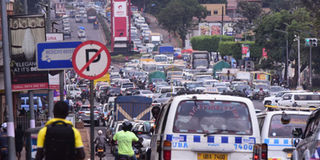Economy to expand to Shs110 trillion

The improvement in economic activities has seen some growth thus leading to an expansion in the size of the economy. PHOTO BY EDGAR R BATTE
Kampala- The Finance Ministry has said the size of Uganda’s economy will increase to Shs110.024 trillion by the end of the 2018/19 financial year due to a pickup in economic activities.
Speaking at the launch of the National Budget Month for the 2019/20 financial year in Kampala yesterday, Dr Gabriel Ajedra Aridru, the Finance state minister in charge of General Duties, said the economy has recovered from a two-year low, registering robust performance in the first half of the 2018/19 financial year.
“The economy is expected to grow faster than projected. As a result, GDP growth for the 2018/19 financial year has been revised to 6.3 per cent from 6.0 per cent,” he said, indicating that the size of the economy will increase to Shs110 trillion in the 2018/19 financial year up from Shs100 trillion in 2017/18 financial year.
The main drivers of the growth, he said, include increased activities in the manufacturing sector, recovery in the construction sector, public sector investments in infrastructure and recovery in the agriculture and services sectors.
Other factors, he said, include growth in regional and international trade, tourism, ICT and financial services.
Dr Ajedra also indicated that government collected slightly more revenue in April grossing Shs1.293 trillion against a target of Shs1.288 trillion, which resulted into a surplus of Shs5.65b.
Cumulatively, tax and non-tax revenue collections for the period between July 2018 and April 2019 stand above target at Shs13.463 trillion against a target of Shs13.101 trillion.
DR Ajedra also indicated that the 2019/20 budget will focus on interventions that will seek to increase GDP growth as well as ensuring that it is an all-inclusive budget.
Therefore, he said, government will focus more on enhancing agriculture production, agro-processing, and investment in physical and social infrastructure to reduce the cost of doing business, facilitate trade and exports, tourism as well as improving social service delivery.
Government will also put emphasis on industrialisation to speed up economic transformation, lower the cost of credit, increase opportunities for youth employment and socioeconomic inclusion, enhance environment protection and mitigate the effects of climate change, among others.
Uganda’s budget is financed mainly through domestic collections, domestic borrowing and external financing through budget support by development partners as well as borrowing on concessional and non-concessional basis.
However, Dr Ajedra said, government will continue to exercise caution while taking on new debt given the rising debt levels, which the IMF have projected to reach 50.7 per cent in the 2021/22 financial year.
Mr Kenneth Mugambe, the director of Budget, said government was through recapitalising Uganda Development Bank, committed to lowering the cost of doing business that has been a problem for a number of Ugandans.
Need for salary review commission
Dr Ajedra also said there was need for government to put in place a Salary Review Commission to streamline all salaries paid to civil servants. This was prompted by the recent proposal by Member of Parliament to increase their pay by 40 per cent.
“We need a salary review commission because the way things are it makes [some workers such as MPs] decide on the amount of salary and allowance they want. Some two years ago they refused to pass the budget because we had not provided for their salary and allowance increments,” he said.
The proposal was supported by Mr Julius Mukunda, the Civil Society Budget Advocacy Group executive director, who said it was high time government put in place a proper mechanism to streamline civil servants’ pay.
During the National Budget Month FY2019/20, government will undertake a number of activities key among them tree planting, donation of scholastic materials to East Kololo Primary School and the budget accountability match.
Other activities will include the budget speech, post budget speech and regional budget breakfast meetings across the country.




